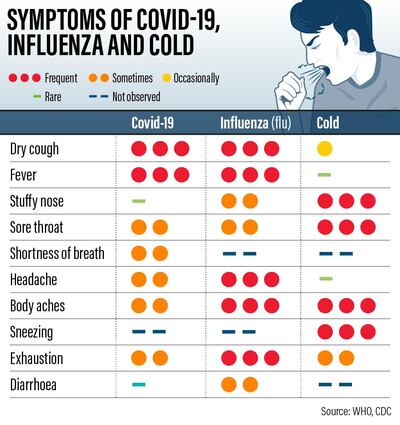As the flu season approaches, doctors have reminded the public about the differences and similarities between influenza and Covid-19.
Both diseases have varying signs and symptoms.
A patient could be completely asymptomatic or suffer severe illness.
And while both viruses are similar in the way they spread and the symptoms presented, one significant difference is the speed of transmission.
People who have Covid-19 could take longer to develop symptoms than if they had the flu, said the Centres for Disease Control and Prevention, a national public health institute in the US.
Both are detected via a nasal or throat swab.
Data collected by the World Health Organisation indicates that someone showing severe symptoms is more likely to have Covid-19 than influenza.
One of the main symptoms of Covid-19 that differentiates it from the flu is a change in or loss of taste or smell, although this is not experienced by everyone.
The recovery rate is faster in the case of the flu, so anyone with persistent symptoms should take a Covid-19 test.
Dr Adel Mohamed Yasin Al Sisi, a critical care consultant at Prime Hospital, said health authorities have issued a checklist to help doctors determine key differences between the viruses as the flu season nears.
“The symptoms of the common cold, influenza and Covid-19 are all very similar,” he said.
“It makes it confusing for physicians but there are also key differences.”
Breathing trouble is ‘clearest sign’
“In Covid patients, we have seen more breathing problems related to a persistent dry cough, whereas influenza patients often report aching bodies, headaches, muscle pain and fatigue,” Dr Al Sisi said.
“If the patient has a fever, we can offer drugs to control that. If there is a cough or a headache, we can also treat that easily.
“Treatment will depend on the symptoms as we can also offer antiviral drugs to flu patients.
“The UAE has been one of the leading nations for Covid testing and we expect that to continue through the winter.”
Medics have also clarified that a flu shot should be taken by all healthy people, especially children, but it does not offer any protection from the coronavirus.
As the demand for seasonal flu vaccines is on the rise, some hospitals have doubled-up on usual orders of jabs while others have already exhausted supplies.
King’s College Hospital in Dubai is one clinic that has run out of flu jabs and has issued an online notice that new supplies are not expected until the end of September.
Increased demand could be due to inaccurate information on social media that the vaccine could offer protection against Covid-19, a theory unsupported by scientific evidence.
But getting the flu shot is important this winter, as the world prepares to face the influenza season and the coronavirus pandemic at the same time.







